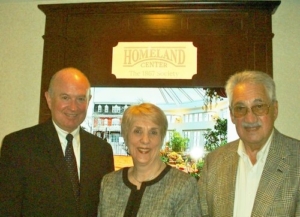Harrisburg police chief takes a dunk for Homeland Center at Summertime Fair
Harrisburg Police Chief Thomas Carter, sitting in the dunk tank, teased Richard Wise.

Harrisburg Police Chief Thomas Carter, who volunteered to help raise money by getting dunked, said he appreciates the prominent role Homeland Center plays in the community.
“You can’t throw,” Carter told the Steelton boy. Richard responded with a pitch that hit the target and sent Carter into the water.
Carter’s dunk tank appearance was the featured event at Homeland Center’s annual Summertime Fair, held Aug. 1, 2015. When Homeland staff met and exceeded his challenge to raise $7,500 for the resident activities fund, he took his perch on the dunking seat.
(See the PennLive coverage here)
Carter said he believes in Homeland’s mission and appreciates its prominent role in the same Harrisburg community where it was founded in 1867 as the “Home for the Friendless.”
“They are still friendly to the neighborhood,” Carter said. “They have a vested interest. I have that same vested interest. We have a natural love for the city.”
Homeland hires much of its staff from the surrounding community, where “neighbors look out for neighbors, and there’s very little to no crime,” said Carter, dressed in a sleeveless t-shirt and athletic shorts for his plunge. The dunking offered “an opportunity for people to meet the chief without all the official stuff on,” he said.
The total $8,500 raised before Carter’s dunking supports a range of activities, including music therapy for residents in the dementia and Alzheimer’s unit and in skilled care. Music therapy has helped Homeland reduce the use of psychotropic medications for dementia and Alzheimer’s patients below suggested federal levels.

“Our residents always look forward to spending time with members of the community,” said Barry Ramper II, Homeland President and CEO, who took the plunge after Chief Carter.
Monroe Rockmaker, of Harrisburg, attending the Summertime Fair with his mother, said she receives very good care and “seems very content. She seems to be at peace.” Music therapy, offered weekly by professional music therapists to improve cognition and interaction, reconnects his mother with the music she has enjoyed all her life.
Rockmaker recalled one session when a harp player brought a visible reaction from his mother, a classical music lover.
“You could feel the happiness,” he said.
Later in the afternoon, resident Carol Cruys took aim at another celebrity in the dunking seat – Homeland Center President and CEO Barry S. Ramper II. Like Carter, Ramper promised to be dunked if staff met the $7,500 fundraising goal.
Cruys tells everyone she meets that Homeland is “the place to be.”
“If you know somebody that needs help, this is the best place,” Cruys said. “Come and visit us, and you’ll see how great it is. There’s nothing you can’t like. They take excellent care of you.”
Amid the laughs of the crowd, Ramper took many falls into the tank, as children and Homeland residents sometimes got help with pushing the release button. After his 30-minute session ended, Ramper thanked Chief Carter for also getting dunked.
“He’s fully committed to Homeland,” Ramper said. “He and the entire Harrisburg Police Department are fully committed. They do an outstanding job, not only for us but for the city.”
Ramper said the annual fair is an event anticipated by Homeland’s residents and neighbors alike. Money raised through the fair and other efforts helps Homeland continue to provide unmatched service in the challenging health care environment, he said.
“Our residents always look forward to spending time with members of the community,’’ said Barry S. Ramper II, Homeland’s president and CEO. “The fair also provides an opportunity for visitors to learn about Homeland and see the quality care that is available for their loved ones.’’






